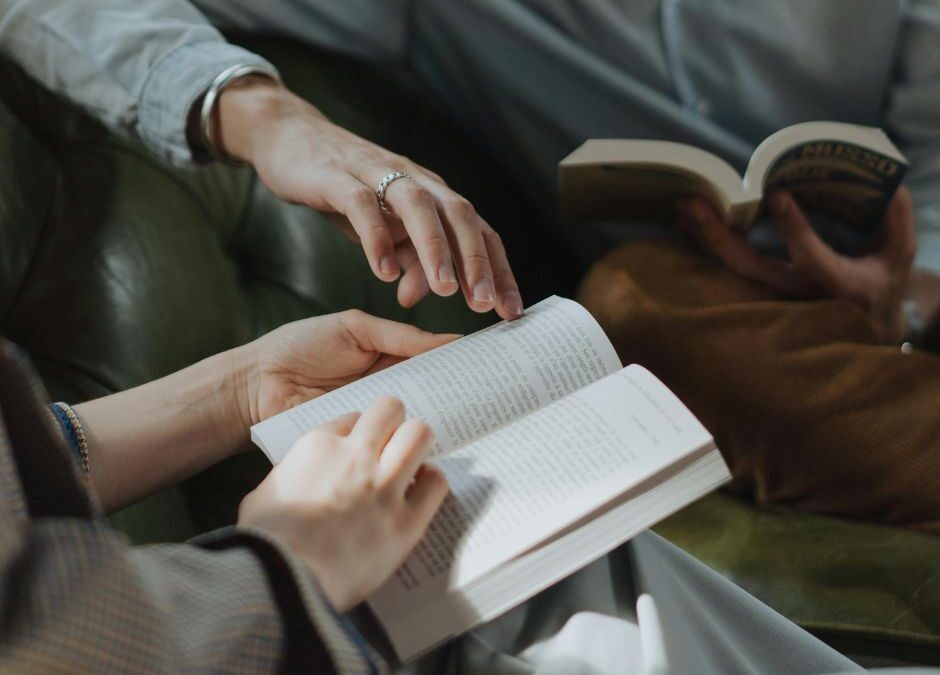Many of us have experienced it: that feeling when you pull out a thick novel or a recognizable classic from your bag and crack it open—whether on the bus, in a waiting room, or at a cozy coffee shop. When reading in public, an air of superiority may swoop over you like the aura of a sixty-year-old literary critic in a tweed suit and spectacles. His scoff resounds in your mind as you think, “Holy sh*t, I’m the smartest person in the room right now.”
Slow your roll, buddy. That PhD doesn’t make you infallible. Now, I’m of the opinion that for the rest of us, a small confidence boost from reading in public is harmless. But if left unchecked, congratulating yourself for your reading habits can instill a superiority complex. Here are my tips for recognizing and limiting bookish entitlement.
Tip 1. Don’t let your book blind you.
Although there are enthralling events unfolding on the page before you, take a second to notice what’s happening in the environment around you: the shape of a rain cloud in the distance, a bird pecking at the muffin crumbs under your seat, the earrings of the person sitting near you. Maybe this person was even waiting for you to look up so they could comment on the title you’re reading. Engage with your local literary community by attending events such as book clubs, author readings, or book festivals. Reading may be solitary, but being a reader doesn’t have to be.
Tip 2. Mind your own book business.
So you typically read books that are categorically intellectual. Take Dostoevsky novels: the sentence structure is long and weird and the main character is super depressed. That’s cool, enjoy. But some people would have a better time reading, say, young adult romantic-fantasy, and they’re still readers too.
You also have no idea what else they’re reading. Maybe they alternate between Sarah J. Mass and Tolstoy (Anna Karenina is a 900-page literary classic about a dramatic love affair). Even if they don’t, they should read what they enjoy without external judgment. This applies the other
way around, too; not everyone wants to read faerie smut. Sometimes, I like a weirdly structured Russian-to-English sentence and a protagonist with a hauntingly existential inner monologue.
Tip 3. Criticize the book, not the reader.
What follows is my reason for the parenthetical “Too” in this post’s title. In recent years, the book world has seen a mass production of trope-centric, copy-paste novels as part of the TikTok consumerism cycle. It has become common for publishers to churn out books with seemingly editor-less writing and a shallow development of important themes, which can be harmful (especially to younger readers). It is good to question the content we consume; even to express a little “hate,” as video essayist /@alishanotalihsha says in her video, taking a hard look at today’s reading culture. A critical eye is always a valuable tool in order to understand the subtext of the content we consume and the ideas it may produce.
But don’t shame others. Let them think for themselves and form their own conclusions. If you’re a reader, you are responsible for reflecting on the implications of the stories you read.
Tip 4. You and your favorite book are not monogamous.
There may come a time when a book you read four years ago is suddenly blowing up on TikTok. It’s frustrating, I know (“They don’t appreciate it/That’s not what it’s about!” etc.). It can be irritating to see the book receive obsessive love overnight, or on the flip side, harsh criticism. To the latter, just remember that everyone perceives literature differently and forms their own conclusions. You can disagree respectfully. To the former, it’s time to swallow your pride. At the end of the day, a great story is inducted into more minds.
Reading can be a pastime, passion, or profession. It might be fun to adopt a proud or minorly self-congratulating persona when you do it, but reading should open minds, inspire exploration, and build an excited community. Are you helping keep it that way?
Meet the blogger: ELENA LASKOWSKI is studying Creative Writing and English at Hamline University. She writes fiction and poetry and sometimes combines the two. Find her work in Hamline’s Fulcrum Journal and Untold Magazine, University of Minnesota’s The Tower (2023), and horror webzine Dark Recesses (2022). She enjoys biking, breakfast foods, and porch-sitting.
ELENA LASKOWSKI is studying Creative Writing and English at Hamline University. She writes fiction and poetry and sometimes combines the two. Find her work in Hamline’s Fulcrum Journal and Untold Magazine, University of Minnesota’s The Tower (2023), and horror webzine Dark Recesses (2022). She enjoys biking, breakfast foods, and porch-sitting.


